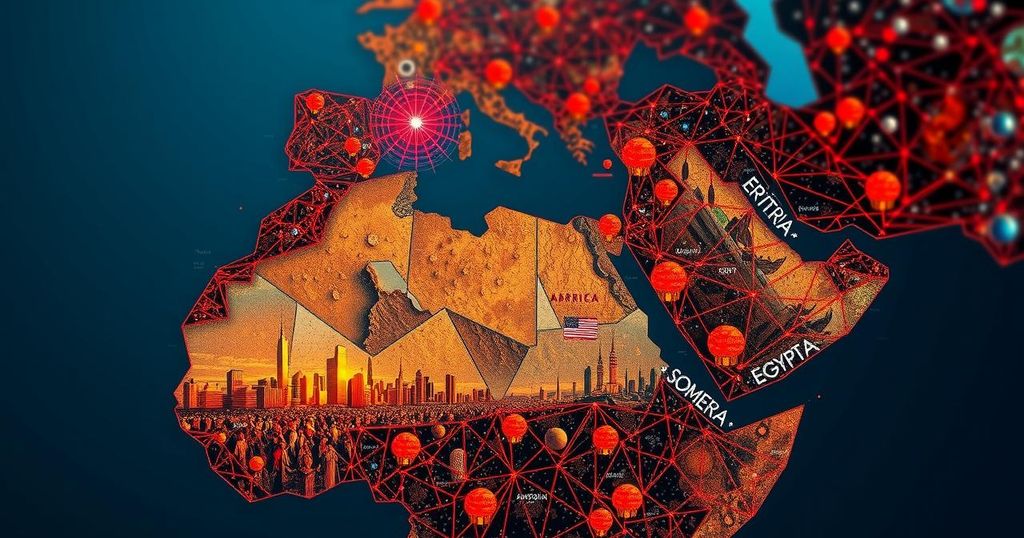Shifting Alliances in the Horn of Africa: An Egypt-Eritrea-Somalia Axis
The recent summit among Egypt, Eritrea, and Somalia indicates a strategic shift in the Horn of Africa’s geopolitics, focusing on encircling Ethiopia amid tensions surrounding the GERD. With Egypt fortifying its military cooperation with Somalia, the meeting underscores the complex historical grievances and alliances in the region, elevating security concerns and the possibility of instability as these nations align against Ethiopia’s growing influence.
The recent trilateral summit attended by leaders from Egypt, Eritrea, and Somalia marks a significant realignment in the geopolitical landscape of the Horn of Africa, a region historically plagued by instability, rivalry, and competing interests. Convened in Asmara, Eritrea, this meeting aimed to present a unified front against regional security challenges, particularly against the backdrop of Ethiopia’s prominent role in shaping these dynamics. While the discussions were officially focused on enhancing cooperation and bolstering regional autonomy, underlying tensions regarding Ethiopia’s actions loomed large. The leaders—Isaias Afwerki of Eritrea, Abdel Fattah al-Sisi of Egypt, and Hassan Sheikh Mohamud of Somalia—underscored their commitment to maintaining territorial integrity and resisting external interference in their joint statement. The Horn of Africa’s intricate web of alliances is further complicated by Ethiopia’s controversial dealings, including its agreement with Somaliland and ongoing disputes with Egypt concerning the Grand Ethiopian Renaissance Dam (GERD). Ethiopia’s purported acquisition of a segment of Somaliland’s coastline has intensified existing tensions with Somalia, which does not recognize Somaliland’s autonomy. In August, Somalia formalized a military pact with Egypt, enhancing its security cooperation with Cairo. This alliance is framed in the context of bolstering Somalia’s capacity to combat the al-Shabaab insurgency through military support and arms provided by Egypt, signaling a potential weakening of Ethiopia’s diplomatic ties in the region and a strengthening of the Cairo-Mogadishu partnership. Not specifically mentioned in summit discussions, Ethiopia’s activities nevertheless emerged as a focal point of concern. The GERD, currently under construction on the Blue Nile, poses a significant existential threat to Egypt’s water security, and the two nations’ negotiations have reached a deadlock. Ethiopia’s unilateral actions have only heightened Egypt’s apprehensions. Eritrea, often labeled as the “North Korea of Africa” due to its isolated and authoritarian governance, seeks to enhance its regional standing through this alliance. Eritrea’s strategic significance, particularly its proximity to the Bab el-Mandeb Strait, enables it to play a crucial role in regional security efforts aimed at countering Ethiopia’s influence. Somalia’s discontent with Ethiopia’s dealings with Somaliland further solidifies its alignment with Egypt, a long-standing rival of Ethiopia. This meeting in Asmara may indicate a redistribution of power in the Horn of Africa, as Egypt, Eritrea, and Somalia strengthen their military and strategic ties, forming a collective stance against Ethiopia’s ascendance. The implications of this new partnership could either stabilize the region or exacerbate existing tensions. Despite the summit’s intentions to promote peace and cooperation, Egypt’s engagement raises concerns regarding its potential for proxy warfare against Ethiopia, prompting Ethiopia to remain vigilant about both diplomatic and military responses. Ethiopia must act decisively to mitigate the escalating tensions. Enhanced diplomatic efforts, both regionally and globally, are paramount. Securing international support, especially from the United States, while navigating its relationships with neighboring Kenya and Sudan, could provide Ethiopia with a necessary strategic buffer. Constructive dialogue on Nile water management could alleviate some tensions, but Ethiopia must prioritize transparent communication to clarify its intentions and stabilize the region.
The Horn of Africa presents a complex geopolitical landscape characterized by historical grievances, rivalry, and shifting alliances among its nations. Central to these dynamics is Ethiopia, which has engaged in contentious negotiations over the Grand Ethiopian Renaissance Dam, a critical infrastructure project perceived as a threat to neighboring Egypt’s water security. The emergence of a trilateral axis among Egypt, Eritrea, and Somalia reflects ongoing regional tensions and power struggles, particularly regarding issues of sovereignty and territorial integrity concerning Eritrea’s past conflicts with Ethiopia and Somalia’s unresolved stance on Somaliland. Understanding these multifaceted relationships is essential to comprehending the broader implications of the recent summit and its potential long-term impact on regional stability.
The summit among leaders from Egypt, Eritrea, and Somalia signifies a pivotal shift in the geopolitical alliances within the Horn of Africa, as these nations align against Ethiopia amidst ongoing tensions. This partnership raises concerns over potential increased aggression and instability, particularly given Egypt’s frustrations regarding the Grand Ethiopian Renaissance Dam. Ethiopia is urged to engage proactively in diplomacy and clarify its intentions to navigate this shifting landscape and secure its regional standing. The dynamics of these alliances will play a crucial role in determining the future stability and security of the Horn of Africa.
Original Source: thehill.com




Post Comment